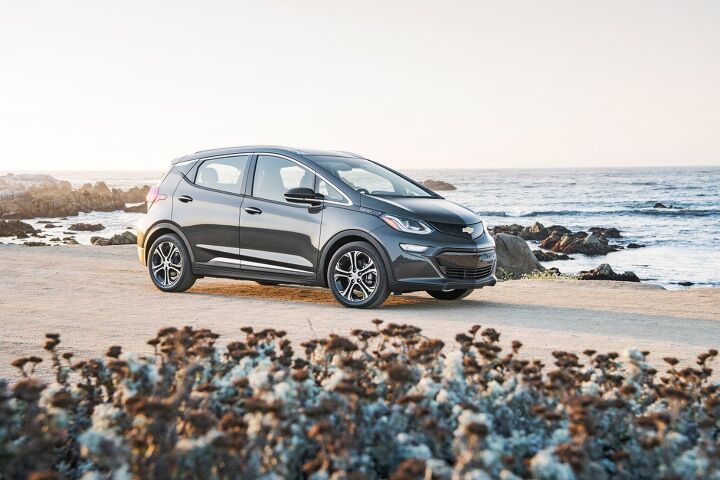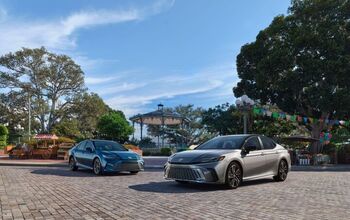North of the Border, Taxpayer Cash Prepares to Flow to EV Buyers

That headline was originally typed as “government cash,” except that wouldn’t be quite accurate, would it? Canada’s federal government tabled its budget Tuesday, and within those dry, dry pages was a helping hand for the struggling electric vehicle segment. While two of the country’s 10 provinces offer their own EV rebates (Ontario used to pony up a princely sum until a change in government last year saw the program kiboshed), there was never a federal program to stimulate the sale of green vehicles.
How does $5,000 pooled from your friends and neighbors sound? Good? Hold your horses, Tesla fans. You don’t apply.
Quite a few prospective EV buyers don’t apply, actually, as the upcoming program carries a vehicle price ceiling of $45,000. Cross-border price inflation means the cheapest Tesla — the Model 3 Standard Range — starts at $47,600. Booooooooo, said the online Tesla fan base.
Detractors might offer up a “cry me a river.”
From the budget:
To encourage more Canadians to buy zero-emission vehicles, Budget 2019 proposes to provide $300 million over three years, starting in 2019–20, to Transport Canada to introduce a new federal purchase incentive of up to $5,000 for electric battery or hydrogen fuel cell vehicles with a manufacturer’s suggested retail price of less than $45,000. Program details to follow.
Under the program, businesses and private contractors who purchase an EV, plug-in hybrid (with a battery larger than 15 kWh), or fuel cell vehicle are eligible for a full tax write-off in year one, assuming the vehicle costs less than $55,000:
Immediate expensing will apply to eligible vehicles purchased on or after March 19, 2019 and before January 1, 2024. Capital costs for eligible zero-emission passenger vehicles will be deductible up to a limit of $55,000 plus sales tax. This is higher than the capital cost limit of $30,000 plus sales tax that currently applies to passenger vehicles. This new $55,000 capital cost limit reflects the comparably higher cost of zero-emission vehicles and will be reviewed annually to ensure that it remains appropriate as market prices evolve over time.
What EVs qualify for the purchase incentive? It’s a short list. A base Chevrolet Bolt, supplies of which are paltry in Canada, slides under the limit by just $200. With 383 km (238 miles) of driving range, that’s the road tripper’s best bet, though this author saw several Twitter commenters complaining about the lack of government incentives for Bolts with more content and better paint. It’s all about concern for the environment, don’t you know.
Nissan’s lowliest Leaf starts at $40,698 and offers 242 km (151 miles) of driving range, though the not-yet-priced Leaf Plus (363 km) might not be on the list after Nissan assigns it an MSRP.
Hyundai’s Ioniq Electric, in both base and Ultimate trim, easily clears the pricing bar, with MSRPs of $37,449 and $42,449, respectively. However, choosing Hyundai nets you a range of just 200 km (124 miles), making it a less than ideal choice for those who regularly make road trips of an hour or more. The same goes for the Volkswagen e-Golf, which beats the Ioniq’s range by 1 km and carries a starting price of $36,720.
If range really isn’t a concern, you might notice that there’s still Smart stores attached to some Mercedes-Benz showrooms. In Canada, the EQ Smart ForTwo starts at $29,050 for the coupe version and $32,050 for the cabriolet, each offering a measly 93 km (58 miles) of driving range. Don’t bother looking for that info on the Smart website, though — it’s not even listed under the submenus of “Specifications” and, amazingly, “Range.”
While your author’s feelings about government incentives for electric vehicles are well known, at least there’s a price ceiling attached to the program. Meanwhile, all bad people owners of gasoline-powered vehicles who may not have alternate transportation options can look forward to a carbon tax that raises the price of gasoline on April 1st. The government needs the revenue.
[Images: General Motors, Nissan]

More by Steph Willems
Latest Car Reviews
Read moreLatest Product Reviews
Read moreRecent Comments
- Tane94 I'd be curious to know whether 87 octane is no longer the most popular grade of gasoline by sales volume. My Costco often runs out of Premium grade and I suspect 93 octane might now be the most popular grade of gas. Paying 40-50 cents more per gallon 87 vs 93 octane because of turbo engines is the real story
- Redapple2 125 large? You re getting into 911 territory.
- Redapple2 Industry worst quality prevents any serious consideration. I ll take an Evil gm Vampire Denali first.
- MaintenanceCosts Thing mentioned in the article: 77 pounds lighter than the standard version!Thing not mentioned in the article: The "lighter" curb weight is 3902 pounds. That is a few pounds heavier than my 2011 335i *convertible*.
- Carson D Printing a trillion dollars every hundred days was not the cause of inflation.



































Comments
Join the conversation
if it's like the previous Ontario rebate, the 45K limit is based on a base trim. So I imagine when they can, Tesla will drop the 3 to 44,999 just to qualify as the battery is considered an 'option'. I imagine the Kona and Niro will drop their base price in Ontario, or the dealer will eat the ~1K just to make the sale.
The price ceiling is too low. Essentially, this program guarantees a continued life for the short-range CARB compliance cars that should have been dying a natural death now that longer-range alternatives are available. Does anyone REALLY want a 58-124 mile range? No. If the government has decided that it's a public policy priority to encourage EV sales, then they should simply copy the program of Ontario's previous government: a credit large enough to erase the price difference between, say, a Corolla and a Bolt. And without throwing in a price cap to appease the bad-faith pearl-clutching of trolls who would have us believe that all electric car buyers are venture capitalists in six-figure Teslas.